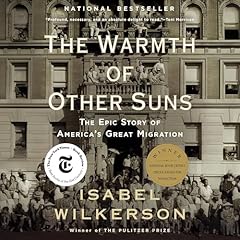
The Souls of Black Folk
Failed to add items
Add to Cart failed.
Add to Wish List failed.
Remove from wishlist failed.
Adding to library failed
Follow podcast failed
Unfollow podcast failed
 Prime members: New to Audible?
Prime members: New to Audible?Get 2 free audiobooks during trial.
Buy for $19.10
-
Narrated by:
-
Mirron Willis
-
By:
-
W. E. B. Du Bois
“The problem of the twentieth century is the problem of the color line,” writes Du Bois, in one of the most prophetic works in all of American literature. First published in 1903, this collection of 15 essays dared to describe the racism that prevailed at that time in America—and to demand an end to it. Du Bois’ writing draws on his early experiences, from teaching in the hills of Tennessee, to the death of his infant son, to his historic break with the conciliatory position of Booker T. Washington.
Du Bois received a doctorate from Harvard in 1895 and became a professor of economics and history at Atlanta University. His dynamic leadership in the cause of social reform on behalf of his fellow blacks anticipated and inspired much of the black activism of the 1960s.
The Souls of Black Folk is a classic in the literature of civil rights.
William Edward Burghardt Du Bois (1868–1963) was one of the greatest African American intellectuals - a sociologist, historian, novelist, and activist whose astounding career spanned the nation’s history from Reconstruction to the civil rights movement. Born in Massachusetts and educated at Fisk, Harvard, and the University of Berlin, his masterpiece remains his most studied and popular work. Its insights into black life at still ring true today.
Public Domain (P)2010 Blackstone Audio, Inc.Listeners also enjoyed...




















Critic reviews
“Thanks to W. E. B. Du Bois’ commitment and foresight—and the intellectual excellence expressed in this timeless literary gem—black Americans can today look in the mirror and rejoice in their beautiful black, brown, and beige reflections.” (Amazon.com review)
Featured Article: The Best Sociology Audiobooks to Better Understand Human Nature and Behavior, Past and Present
Sociology audiobooks provide an easily accessible and convenient way to connect to a variety of topics and perspectives around the sweeping study of human nature and behavior. To get you started on your journey of discovery, we’ve gathered a sampling of the best sociology audiobooks available, from classics to biographies to contemporary releases.
People who viewed this also viewed...


















Amazing rendition
Something went wrong. Please try again in a few minutes.
Enlightened!!!!
Something went wrong. Please try again in a few minutes.
Historical
Something went wrong. Please try again in a few minutes.
Important historic sketch frames current problems
Something went wrong. Please try again in a few minutes.
should be required reading
Something went wrong. Please try again in a few minutes.



